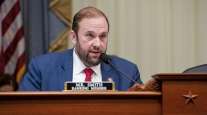Threat to End Federal Fuel Taxes Concerns Transportation Officials
This story appears in the Aug. 8 print edition of Transport Topics. Click here to subscribe today.
Faced with the expiration in September of federal transportation taxes on gasoline and diesel fuel, highway advocates say they are increasingly worried that the anti-tax, anti-government rancor that characterized the debt ceiling battle could endanger the nation’s transportation system.
The previous long-term surface transportation spending plan ran out two years ago, and the latest temporary extension expires Sept. 30.
Click here for this week’s editorial: ‘Beware the Next Threat.’
Without another extension, the government cannot collect fuel and other taxes that fund the Highway Trust Fund and support thousands of construction projects and safety enforcement programs across the country.
Any hope that transportation reauthorization, which Congress is set to take up next month, would escape the anti-tax mood in Washington dimmed last week when Grover Norquist, founder of the conservative anti-tax group Americans for Tax Reform, announced he had moved on from the debt ceiling to transportation.
Norquist said he is launching an effort to persuade Congress to shift federal transportation planning and policymaking to the states and to eliminate federal fuel taxes. “We’re for ending it as soon as possible,” Norquist told Transport Topics.
The news that Norquist wants to dismantle the nation’s transportation funding system was met with dismay by highway advocates, including Brian Turmail, spokesman for the Associated General Contractors of America.
At least some groups are getting ready to counter the challenge.
Turmail said his group is prepared to fight Norquist “tooth and nail. . . . This is exactly the kind of a fight that we have been anticipating all year and have been taking steps to address.”
“If you ended the federal transportation program, what you would do is kill millions of jobs and throw the economy into a tailspin,” said Darrin Roth, director of highway operations for American Trucking Associations.
“We can’t just assume the states will adequately maintain the Interstate Highway System,” Roth said. The system is “way too valuable an asset to simply throw caution to the wind.”
The 18.45-cent gas tax and the 24.4-cent diesel tax that flow into the Highway Trust Fund help states build and maintain roads and bridges. Roth said the revenue also helps underwrite safety and enforcement programs.
“If what he’s proposing is to effectively end those agencies and the programs . . . he’s certainly endangering lives,” Roth said.
Norquist’s notion that the federal government ought to play a lesser role than states in making transportation policy and building infrastructure “belies the importance of a national transportation system to our economy and our way of life,” said Jack Schenendorf, vice chairman of the National Surface Transportation Policy and Revenue Study Commission.
The congressional commission, created in 2006 to study transportation funding policies, recommended raising fuel taxes, something that has not been done since 1993.
“American businesses who pay the tab — not who benefit but who pay the tab — recognize the need for more federal investment, not less federal investment,” Schenendorf said.
The transportation system was built more than a half-century ago for a smaller population and was filled with excess capacity, he said.
Today, the system is crumbling and facing gridlock, having aged and lost its excess capacity, Schenendorf said.
“When you look at any of these facts, how you can conclude that we don’t need to continue a federal role in transportation, frankly, to me means you don’t really understand the national . . . network and the role it plays and the challenges it’s facing,” Schenendorf said.
Matt Jeanneret, spokesman for the American Road and Transportation Builders Association, echoed those sentiments.
“I don’t think there’s any doubt that the nation’s infrastructure system is crumbling,” Jeanneret said. “I don’t see how you think eliminating nearly half of the funding for that is going to make the problem any better.”
The movement of interstate commerce requires a national highway network, Jeanneret said. “You can’t have a patchwork of 50 state networks, and I think both conservatives and liberals recognize that.”
A day after Norquist made his announcement, his spokesman, John Kartch, reiterated that the anti-tax group will reach out to Republican members of Congress to build consensus and also will sound out voters about ending or phasing out the fuel tax.
Kartch said ATR plans to be involved in both a debate about a temporary extension and debates on a long-range reauthorization plan.
Bob Poole, transportation policy director for the Reason Foundation, another conservative group, said he too once thought that the federal role in transportation ought to be scaled back and power shifted to the states.
That was before he studied transportation, Poole said. Those who think the highway system is now built and needs no work do not understand that “highways wear out, and highways built 50 years or more ago need complete reconstruction from the . . . base up, and that has to be done at today’s and tomorrow’s costs, not the costs we paid in the ’50s,” he said.
Norquist’s take on that comment? The Interstate Highway System was built in the 1950s, “for crying out loud,” he said. “The highways are built. They’re laid out, and the states can now handle the rest of it,” Norquist said in an Aug. 2 interview with TT.




